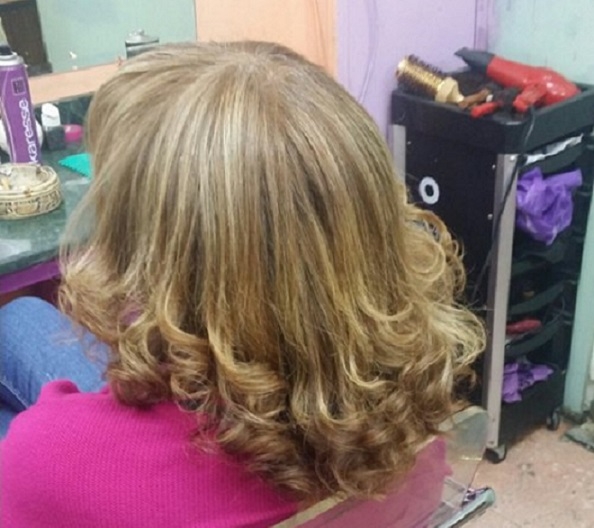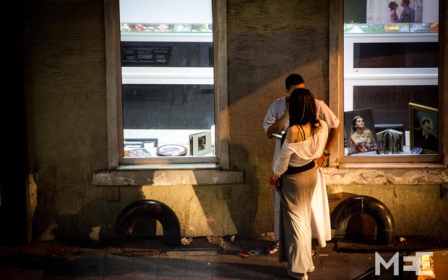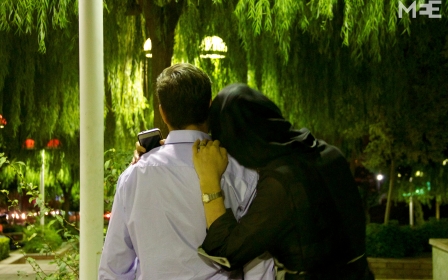Transsexual and Egyptian: Defying the odds

CAIRO - “You noted these right?” Nourhan asks pointing at her chest before breaking into a cheeky laugh.
Sitting in a fast food restaurant in Cairo’s sprawling district of Nasr City, Nourhan – who is in her 30s - talks away animatedly over a burger and fries, admitting that the beauty spot above her lip has been tattooed à la Cindy Crawford, the American supermodel.
Wearing skintight jeans and an equally fitting, low-cut floral shirt - large Gucci style sunglasses are resting on top of her long and straightened blonde-dyed hair. Add to this her red nail varnish and pink lipstick, and long gold dangling earrings – Nourhan stands out.
In a society where there is huge pressure on women to dress and act modestly in public, Nourhan flaunts her curves and commands attention with her vivacity and confidence.
But then Nourhan is no stranger to pushing the boundaries: born as a male, Nourhan became a woman following successful gender reassignment surgery in 2014.
She is one of 21 Egyptians who have received the required permission to undergo the surgery from the Egyptian Doctors' Syndicate after it officially recognised gender identity disorder – the condition describing people who feel their body doesn’t reflect their true gender - in 2013, marking what an Egyptian human rights advocate has said was a landmark moment for the country’s transgender community.
“It’s a huge shift to have more and more medical personnel on board supporting the cause,” said Dalia Abdel Hameed, head of the gender programme at the Cairo-based Egyptian Initiative for Personal Rights (EIPR). “Trans people themselves are organising themselves more and organisation is key for any success.”
But in the year since Nourhan’s transformation, the committee that reviews surgery applications - which consists of doctors and a representative of Al Azhar, a prestigious learning centre of Sunni Islam - suspended the process when the member from Al Azhar became uncomfortable and stopped attending review sessions.
It’s not just the halting of the procedure that has raised major concerns for the community whose size is unknown, but thought to be growing.
Over the past year, advocates say that authorities have stopped several Egyptians who have already undergone the surgery from changing their official documents and IDs to reflect their new gender.
And even for Nourhan, who has managed to have the surgery and also change her documents and, by all accounts, has had a better experience than many Egyptian transsexuals, everyday challenges at work and with her family remain.
Suffering alone
“I never played with my brothers when I was younger. They tried to make me but I refused,” Nourhan shrugs. “I knew I was transgender from a very young age.”
Nourhan attended boys’ schools, which she admits - in her characteristically matter of fact manner - was difficult. The other boys wouldn’t play with her and and she didn't want to play with them either.
Instead, she explains, “They harassed me and touched me sexually because I was feminine. They thought I was gay or whatever.”
Her teachers were aware of her lack of interaction with other students. However, they didn’t speak to her parents because – in her own words - she was the “cleverest in her year” and “they thought it was normal behaviour for nerds” like her.
But Nourhan felt unable to confide in her teachers or parents about her suffering. Strict definitions of Arab masculinity meant that admitting boys were harassing her, while she was still a boy would be shameful and “would have everyone asking questions”. She feared such an admission would result in beatings from her parents.
Instead, Nourhan suffered alone in silence.
She completed a PhD in Engineering and began teaching in 2003 at the Cairo-based university of Al Azhar, where she continues to work to this day.
Stigma
But up until her gender reassignment, Nourhan said she continued to experience consistent abuse. “People were constantly knocking on my apartment door to harass me before the surgery,” she said.
After Nourhan started hormone treatment, it was obvious to onlookers that she was transgender, but she continued to dress like a man because she said she felt unsafe in public. But one day, a man attacked her in the street anyway.
“While beating me, he accused me of being gay, so then others joined in,” she said.
Nourhan’s experience reflects a wider misunderstanding across the Middle East and North Africa about what it means to be transgender, said Sherine El Feki, author of the 2013 book “Sex and the Citadel” which looked at the sex lives of Arabs, and its connection to politics, religion and the wider society as uprisings spread across the region.
“Most people think of it as just another manifestation of homosexuality,” El Feki said. That leaves transgender people to “become subject to the same discrimination, if not more, of what homosexuals receive”.
Because men have greater rights and freedoms than women in Egypt, El Feki said, society is tougher on people like Nourhan who are seeking to become women than it is on women who are seeking to become men.
“Why would anyone want to lower their status?” Feki said people ask themselves.
Last year, Egyptian police arrested more than 150 transgender women in a crackdown on the country’s LGBT community, Mada Masr reported.
Transgender women, according to the report, struggle to find work, especially if they appear effeminate and their appearance doesn’t match their ID. As a result, many turn to prostitution, making them more vulnerable to arrests.
By comparison, Nourhan – who said she has never had problems before or after surgery with the police, carrying a letter around from her psychotherapist explaining that she was transgender – has had a much easier transition.
New gender, new ID?
In 2013, when the Doctors’ Syndicate issued a new Code Of Ethics that allowed transgender patients to have gender reassignment surgery with their permission, Nourhan was already in a position to apply: she had already had two years of required psychiatric treatment and a diagnosis of gender identity disorder.
Her application was successful and, in 2014, she went overseas to have her operation out of concern over the quality of treatment available in Egyptian state hospitals.
Only after completion of surgery can the gender be changed on ID and other papers in Egypt. Seven months after her surgery and becoming transsexual, Nourhan’s documents were formally changed in April 2015.
But Nourhan admits that she was “very lucky”: changing official records is still a major obstacle for many transsexuals as highlighted by the recent case of Eiden, who completed the reassignment surgery, but whose document changes were blocked by the Administrative Court.
The court's ruling was guided by Islamic Sharia law, and claimed that Eiden’s problem was merely psychological and that such operations can only be authorised on the basis of a physical condition as, for example, in cases where a person has both male and female sex organs.
Eiden is not alone, said Abdel Hameed from EIPR. “We have encountered this so many times over the past few months. We find a trans person who has completed all the surgery and once they want to change their papers there is refusal”.
Uproar at Al Azhar
With her new papers and ID, Nourhan believed she would finally be able to get on with her life and, immediately after they were changed, started coming to work as a woman.
However, her presence caused uproar at work. Some colleagues stopped talking to Nourhan and a few insulted her. The following month, Al Azhar suspended Nourhan from her position until the Supreme Council of Al Azhar made its final decision on the situation.
In December, the council said she could stay on at the university, but only in an administrative role – earlier, she had been teaching engineering.
“They want to avoid confrontation with students,” she said.
Nourhan – who has taken the job in the meantime – is angry particularly given that Al Azhar was represented on the Doctors’ Syndicate committee when she gained their permission for surgery.
While EIPR’s Abdel Hameed sympathises with Nourhan, she said many in her situation would have lost their jobs. Author El Feki said Al Azhar’s reaction was “not surprising”.
“One could argue this is progress in a sense as she’s allowed to stay on,” El Feki said, comparing Nourhan’s situation to the case of Sally Mursi, a medical student who underwent gender reassignment in 1988 and was prevented from returning to her studies.
But the comparisons are little comfort for Nourhan who has filed a lawsuit against the university. Al Azhar did not respond to Middle East Eye’s requests for comment on Nourhan’s case.
Finding love
Despite the visible frustration of her work situation, changing her ID also meant Nourhan could get married legally which she did straight away.
“Ours is a love story,” said Nourhan whose eyes light up at the mere mention of her husband.
“We met online years before my surgery, when I still dressed as a man. I was honest from the beginning and he was very supportive. After three months of chatting online, we met,” she said.
Her husband, who has asked not to be named, admits their situation is difficult. “None of my friends or family know that she’s transsexual because they won’t accept it at all, especially my parents,” he said.
And it's not only his parents.
“My mum won’t speak to me or let me in her house,” said Nourhan with a hint a disappointment, but hopes that the situation will change. “I would like to have a relationship with her."
Middle East Eye propose une couverture et une analyse indépendantes et incomparables du Moyen-Orient, de l’Afrique du Nord et d’autres régions du monde. Pour en savoir plus sur la reprise de ce contenu et les frais qui s’appliquent, veuillez remplir ce formulaire [en anglais]. Pour en savoir plus sur MEE, cliquez ici [en anglais].




